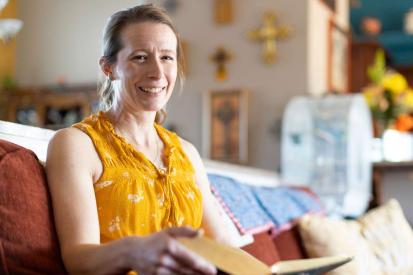Oregon: Adopt Gender Ideology Before Adopting Children


In the Bible, James 1:27 says, “Religion that is pure and undefiled before God the Father is this: to visit orphans and widows in their affliction, and to keep oneself unstained from the world.”
Christianity has had a long tradition of caring for orphans, and today, practicing U.S. Christians are more than twice as likely to adopt as the general population.
Jessica Bates is one such Christian who seeks to continue in that legacy of caring for the orphan. But unfortunately for Jessica, her home state of Oregon requires that before a family can adopt or foster children, they must adopt the state’s radical gender ideology and “respect, accept, and support” the sexual orientation and/or gender identity of any child that could be placed in their home.
Such a policy categorically excludes people who believe that human beings are unchangeably male or female—a belief based in biological reality. And it only serves to harm children by reducing the number of families able to provide a loving home.
That’s why Alliance Defending Freedom has stepped in on Jessica’s behalf.
Let’s explore the details of her case.

Who is Jessica Bates?
Jessica Bates is a mother of five who lives in rural Malheur County, Oregon. She was widowed after her husband David died in a car crash in 2017.
Jessica’s children are her greatest joy, and as a devout Christian, she wants to open her home to children in need. Though she is busy raising five children of her own, Jessica felt called to pursue adoption when she heard a Christian broadcast about a man who had adopted a child from foster care.
Jessica’s family has been through a lot, but she has experienced firsthand how God has provided for her as a widow and cared for her children who miss their earthly father. Jessica wants to replicate what God has done for her by opening her home to a sibling pair who need a family that they can call their own.
But sadly, when Jessica applied to become certified to adopt, Oregon denied her application because Oregon requires every family to first adopt the state’s view of human identity and sexuality.
This left her with two options: abandon her beliefs or give up the possibility of adopting a child. That’s something Jessica couldn’t do—and shouldn’t have to.
Bates v. Pakseresht
The Oregon Department of Human Services (ODHS) requires that people seeking to adopt must “respect, accept, and support” the sexual orientation and/or gender identity of any child who ODHS could place in the applicant’s home.
This guidance obligates parents to agree to use a child’s self-selected pronouns, take a child to Pride parades, or facilitate an adolescent’s access to harmful interventions like puberty blockers and cross-sex hormones. But such rules would force Jessica to violate her religious beliefs.
Jessica believes that God created humans as male and female and that a person’s God-given sex has spiritual significance for who they are and how they should act. And she believes that a person cannot choose his or her gender because this aspect of a person’s identity is inextricably intertwined with their sex.
As a Christian, Jessica always seeks to speak the truth, and as a mother, she desires to raise her children in the faith. Therefore, she cannot encourage a child to live or identify as a gender that is not aligned with their biological sex.
During her application process, Jessica alerted ODHS that she will gladly love and accept any child, but she cannot say or do anything that goes against her Christian faith. In response, ODHS gave her two choices: abandon your religious convictions or forego the possibility of ever adopting a child. When Jessica stood her ground, ODHS rejected her application for failing to “meet the adoption home standards.”
ODHS’s policy amounts to an ideological litmus test: people with secular or “progressive” views on sexual orientation and gender identity are eligible to participate in child welfare programs, while people of faith with religiously informed views on these topics are categorically disqualified. And though the state accommodates caregivers with diverse cultural and religious beliefs on other topics and tries to place children accordingly, it punishes caregivers like Jessica because they disagree with the state’s orthodoxy on sexual morality and our human identity.
That’s why Alliance Defending Freedom is representing Jessica. Oregon’s policy not only violates the rights of people like Jessica looking to adopt or foster, but it also hurts vulnerable children by putting up unconstitutional barriers to adoption, foster care, or any other program involving child welfare.
What’s at stake?
Oregon’s policy penalizes Jessica for her religious views, compels her to speak words that violate her beliefs, and deprives her of the equal protection of the law. Most of all, the policy takes away loving homes from children in need.
Jessica need not check her religion at the door to show that she can care for a child. All she asks for is the chance to access the state’s programs on an equal playing field with everyone else.
Case timeline
- March 2022: Jessica began the process of applying to become certified to adopt a child from Oregon’s foster care system.
- September 2022: Oregon denied Jessica’s application because of her religious beliefs.
- March 2023: ADF filed a federal complaint on Jessica’s behalf.
- December 2023: After a federal district court ruled against Jessica, ADF attorneys appealed her case to the U.S. Court of Appeals for the 9th Circuit, asking the court to allow Jessica to access Oregon’s adoption system free of discrimination while her lawsuit continues.
The bottom line
Oregon’s policy is both morally wrong and flagrantly unconstitutional. The government cannot categorically exclude families from foster and adoption programs solely because it does not like their religious views.
